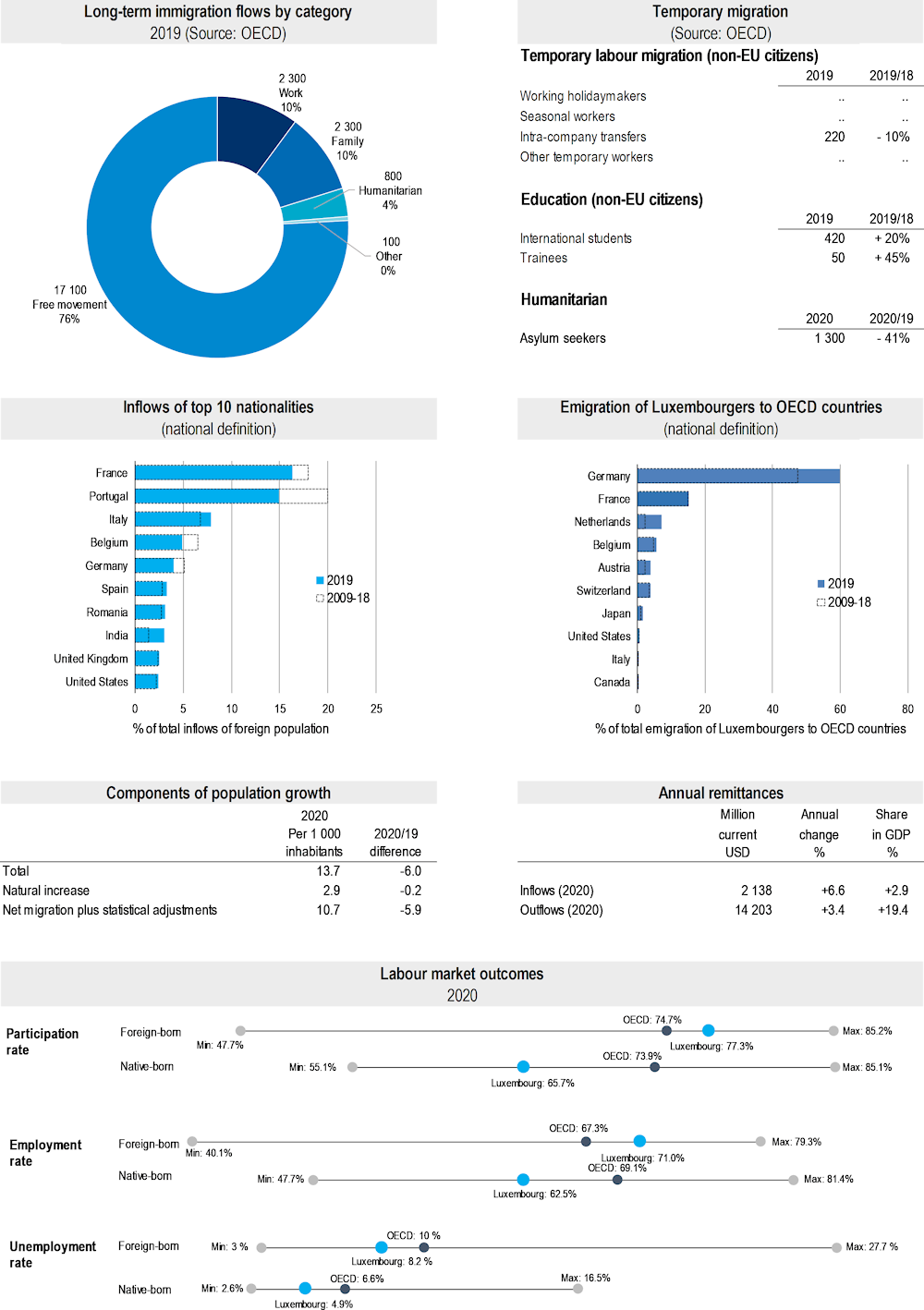In 2019, Luxembourg received 23 000 new immigrants on a long-term or permanent basis (including changes of status and free mobility), 4.6% more than in 2018. This figure comprises 75.7% immigrants benefitting from free mobility, 10.1% labour migrants, 10.1% family members (including accompanying family) and 3.5% humanitarian migrants. Around 400 permits were issued to tertiary-level international students and 300 to temporary and seasonal labour migrants (excluding intra-EU migration). In addition, 53 000 intra-EU postings were recorded in 2019, an increase of 45% compared to 2018. These posted workers are generally on short-term contracts.
France, Portugal and Italy were the top three nationalities of newcomers in 2019. Among the top 15 countries of origin, Portugal registered the strongest increase (300) and Poland the largest decrease (‑64) in flows to Luxembourg compared to the previous year.
In 2020, the number of first asylum applicants decreased by ‑41.1%, to reach around 1 300. The majority of applicants came from Syria (400), Eritrea (300) and Afghanistan (100). The largest increase since 2019 concerned nationals of Sri Lanka (5) and the largest decrease nationals of Eritrea (‑300). Of the 1 200 decisions taken in 2020, 64.4% were positive.
In 2019, Luxembourg introduced long-term visas simplifying the entry and stay of third country nationals without the need to apply for a residence permit. Four laws clarifying the status of British nationals residing in Luxembourg were passed to ensure the legal status for UK citizens, largely present in the banking and service sectors. The Immigration Law was amended to combat irregular migration more effectively and to ensure a more efficient retention and return of irregularly staying TCNs.
As of 1 January 2020, Luxembourg created the National Reception Office (ONA) by splitting the competences of the Luxembourg Reception and Integration Agency (OLAI). The ONA, attached to the General Secretariat of the Ministry of Foreign and European Affairs, is responsible for organising the reception of applicants for international protection and creating and managing accommodation facilities reserved for the temporary accommodation of applicants for international protection and people eligible for subsidiary protection.
A new Integration Department was created under the auspices of the Ministry of Family Affairs, Integration and the Greater Region handling all matters relating to the integration of foreigners, as the Welcome and Integration Contract (CAI) and the Guided integration trail (PIA). The Integration Department is also co‑ordinating the multiannual National Integration Plan (PAN) and the implementation of the Local Integration Plans (PCI). In 2020, 13 projects supporting social, cultural, and economic initiatives empowering communities and societal groups were implemented under the PAN. The projects had a focus on young people, as well as the development of efficient integration strategies. A new call for proposals for 2021 was launched at the end of 2020.
Through intra-municipal and regional co‑operation, local integration plans have been developed increasingly, thus adapting to the reality of integration in suburban and rural areas. Good practices are exchanged in the Local Integration Exchange and Support Group (GRESIL) which emphasised the co‑operation between communities during their 2019 sessions.
Given the tight housing situation, the ONA increased their efforts to incentivise cities and municipalities to provide adequate and affordable housing for beneficiaries of international protection even after they exceed the maximum duration of stay in any reception facility.
On January 2019, the REVIS (Social Inclusion Revenue) substituted the RMG (guaranteed minimum revenue). The new legislation clarifies that all beneficiaries of international protection older than 25 years and their dependants are entitled to the REVIS. Asylum seekers do not benefit from the REVIS.
Luxembourg reached bilateral agreements with its neighbours ensuring the free circulation of cross-border commuters when the borders with Luxembourg were closed. Many cross-border workers work in the health industry and uphold the full operation of the health care system.
Luxembourg renewed all residence permits as well as short-term visas for TCNs which would have expired at the end of the state of crisis, in addition to asylum seekers’ certificates. ONA also opened eight new reception facilities for asylum seekers in 2019‑20. Luxembourg provided TCNs in situations of irregular stay with access to social grocery stores and COVID‑19 medical resources. Repatriation and Dublin transfers were suspended during the crisis.
For further information:

